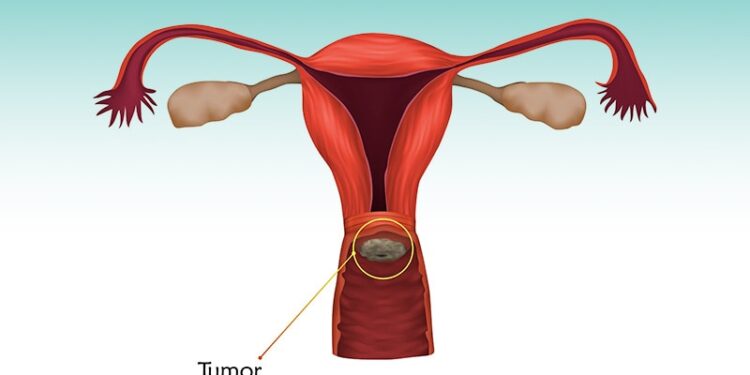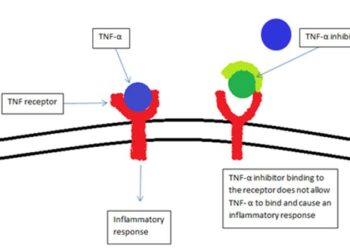CHICAGO — Patients treated for cervical cancer need dedicated survivorship care to address long-term symptoms and sexual health concerns.
That was the conclusion of a review of patient-reported outcomes (PROs) from among 919 women in the international phase 3 OUTBACK trial. The PROs showed that numerous sexual health symptoms and concerns persist 3 years following treatment, Linda Mileshkin, MD, reported at the American Society of Clinical Oncology (ASCO) 2025.
The 10 top-ranked PROs at 1-year follow-up — based on responses from the 64% of trial participants who completed a European Organisation for Research and Treatment of Cancer (EORTC) questionnaire — and their persistence or resolution at 2-3 years, based on responses from 37% of trial participants, are listed in the table below.
Table. Frequency and Duration of Top-Ranked Moderate-to-Severe Symptoms
| 10 most common moderate-to-severe PROs after cervical cancer treatment | Number (percentage) of patients reporting symptoms at 1 year | Number (percentage) of patients reporting symptoms at year 2 or 3 |
| Worries about future health | 135 (44) | 49 (36) |
| Hot flashes/sweats | 132 (37) | 49 (37) |
| Frequent urination | 126 (35) | 45 (36) |
| Sexual activity not enjoyable | 125 (64) | 43 (34) |
| Trouble sleeping | 117 (32) | 37 (32) |
| Feeling tired | 104 (29) | 33 (32) |
| Changes in bowel habits | 102 (28) | 41 (40) |
| Financial difficulties | 101 (28) | 32 (32) |
| Pain | 96 (27) | 23 (24) |
| Dissatisfied with body | 95 (26) | 27 (28) |
| PROs = patient-reported outcomes PROs were based on responses to the EORTC core questionnaire QLQ-C30; cervical cancer module QLQ-CX24 (questions 50-54 only for sexually active points); EORTC Item Library questions on abdominal, urinary, bowel, and chemotherapy side effects; and FACT-GOG-NTX-4 neurotoxicity over 36 months. A moderate-to-severe long-term symptom issue was defined as a score in the worst 2 response categories (EORTC items), a total score ≤ 8/16 on FACT-GOG-NTX4 at years 1, 2, or 3 for Objectives 1-2, or an equivalent subscale score for Objective 3. Adapted from Mileshkin L. Program and abstracts of the 2025 ASCO Annual Meeting; May 30 to June 3, 2025; Chicago, Illinois. Abstract 5503. | ||
The OUTBACK trial assessed the addition of adjuvant chemotherapy (ACT) after chemoradiotherapy (CRT) for the treatment of locally advanced cervical cancer. That study demonstrated that ACT increased adverse events without improving overall survival compared with CRT alone.
Regardless of whether patients were assigned to the CRT + ACT or CRT-only treatment group, the issues and frequencies from PROs in the current analysis were observed, reported Mileshkin, who is director of Medical Oncology at the Peter MacCallum Cancer Centre in Melbourne, Australia, and first author for the OUTBACK trial.
Given the low questionnaire completion rates at 2-3 years, the PROs may represent underestimates, she said.
At 1 year, moderate-to-severe peripheral neuropathy affected 24% and 18% of those who received CRT + ACT and those who received only CRT, respectively, and at 3 years, the corresponding rates were 19% and 12%. At baseline, 77% of patients reported no sexual activity in the prior 4 weeks, and at years 1, 2, or 3, 92% reported low sexual activity, 68% reported low enjoyment, 40% reported moderate-to-severe vaginal tightness, 37% reported vaginal dryness during sex, and 32% were moderately to severely worried that sex would be painful.
The rates of poor sexual enjoyment were somewhat lower with CRT-only treatment, whereas the rates of sexual worry were higher among those with CRT + ACT. Age younger than 60 years was an independent risk factor for experiencing sexual concerns.
Though limited by the low completion rate at 3 years and a lack of data on menopausal symptom management and use of vaginal estrogen or dilators, the findings underscored the importance of discussing and managing the long-term effects of CRT with patients, Mileshkin said during her presentation at the meeting.
Cervical cancer treatment in clinical practice will change over time, but “meanwhile, there’s going to be hundreds of thousands of women who’ve had this type of treatment who continue to recover and live with these side effects,” she stressed.
“I hope [these findings] will help clinicians remember to ask patients about these issues and try to address them because women won’t necessarily volunteer them themselves.”
Mileshkin disclosed honoraria from GlaxoSmithKline and the limbic; research funding from BeiGene; and travel, accommodations, expenses, and another relationship with Roche.
Sharon Worcester, MA, is an award-winning medical journalist based in Birmingham, Alabama, writing for Medscape Medical News, MDedge, and other affiliate sites. She currently covers oncology, but she has also written on a variety of other medical specialties and healthcare topics. She can be reached at [email protected] or on X: @SW_MedReporter.
Source link : https://www.medscape.com/viewarticle/sexual-effects-persist-after-cervical-cancer-treatment-2025a1000gh7?src=rss
Author :
Publish date : 2025-06-20 10:58:00
Copyright for syndicated content belongs to the linked Source.














